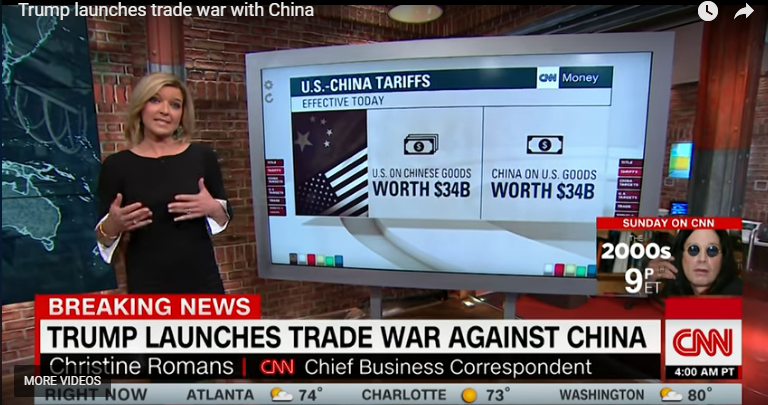Trump Channels Tricky Dick
“I’m not thrilled,” President Trump told CNBC's Joe Kernen in an interview that aired on "Squawk Box" friday morning. “Because we go up and every time you go up they want to raise rates again. I don't really — I am not happy about it. But at the same time I’m letting them do what they feel is best.”
Since becoming POTUS, Trump has changed his tune about rates. When Janet Yellen was running the Fed, Trump said she should be “ashamed” for holding down rates. He endeared himself to libertarians at the time by saying the low rates created a “false stock market.”
Then after his election he mentioned the stock market constantly. "It would be really nice if the Fake News Media would report the virtually unprecedented stock market growth since the election," Trump tweeted in October 2017. A year before Trump had warned America to beware of a "big fat bubble" in stocks.
Today, he tweeted,
The United States should not be penalized because we are doing so well. Tightening now hurts all that we have done. The U.S. should be allowed to recapture what was lost due to illegal currency manipulation and BAD Trade Deals. Debt coming due & we are raising rates - Really?
There’s plenty of blather that Trump is breaking with presidential norms by criticizing Jerome Powell’s rate hikes, but, the Donald is merely channeling Richard Nixon. When Nixon appointed Arthur Burns to be Fed Chair in October of 1969, Burns was soaking up the applause during the announcement of his appointment when Nixon broke in, saying, “You see, Dr. Burns, that is a standing vote of appreciation in advance for lower interest rates and more money.” Later, in private, Nixon told his new Fed Chair, “You see to it: no recession”
In a chapter for the book The Fed at One Hundred entitled “Arthur Burns: The Ph.D. Standard Begins and the End of Independence” I wrote,
The president didn’t trust the central bank, but with Burns he would have one of his own in charge. At the same time, when Burns took the oath of office in January 1970, Nixon said, “I have some very strong views on some of these economic matters and I can assure you that I will convey them privately and strongly to Dr. Burns. ...I respect his independence. However, I hope that independently he will conclude that my views are the ones that should be followed.”
Trump’s communication style is different in that he hopes Chairman Powell will be reading his tweets and watching CNBC. However, Trump believes himself an imperial leader just as Nixon did.
Burns may have been a friend [of Nixon’s], but “he was still the emperor and I should therefore toe the mark—as should every good citizen, especially those that professed to be his friends.” Burns concluded his diary entry with, “now I knew that I would be accepted in the future only if I suppressed my will and yielded completely—even though it was wrong at law and morally—to his authority.”
Perhaps one day Powell will see Trump as Burns viewed his friend the President--as having
“uncontrolled cruelty,” and that he [Burns] “was seized suddenly with fear for the safety of our country which depended so heavily on this insecure man (the thought flashed through my mind of an earlier conversation, when he asked me to inform him when I thought it would be a good time to bring on an international monetary crisis and added, winking privately as he spoke, ‘I don’t mind crisis’—the I being heavily underlined).”
Former Fed governor Kevin Warsh, a candidate for the Fed Chair appointment, said on a Politico podcast this year that during his interview, Trump made clear his opinions on interest rate policy.
“If you think it was a subject upon which he delicately danced around, then you’d be mistaken. It was certainly top of mind to the president,” Mr. Warsh said. Later, he added: “In some sense the broader notion of an independent agency, that’s probably not an obvious feature to the president.”
As Rob Crilly described the Trump Administration in The Telegraph, “Each day brings fresh chaos and an escalating sense of crisis.”
Today, Fed policy is the chaos.






